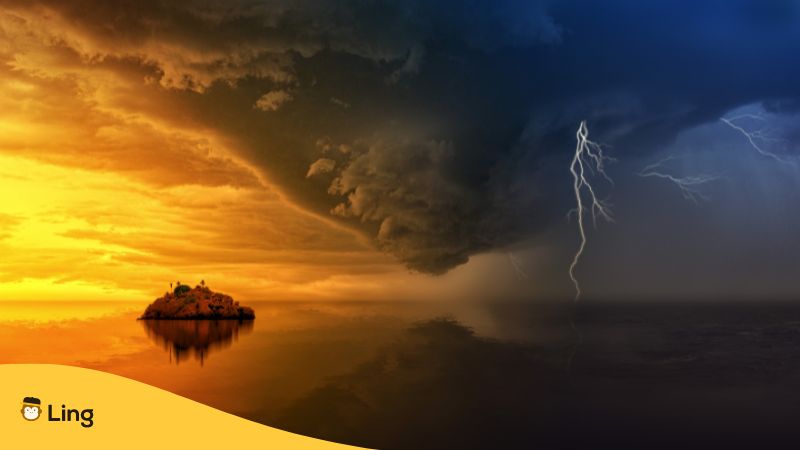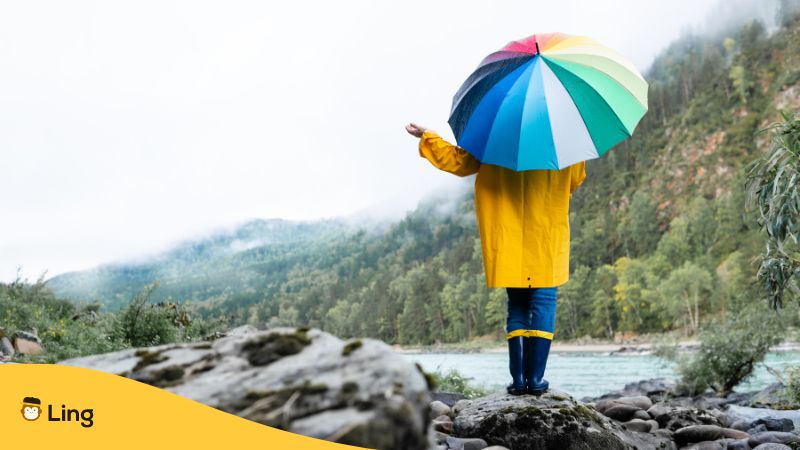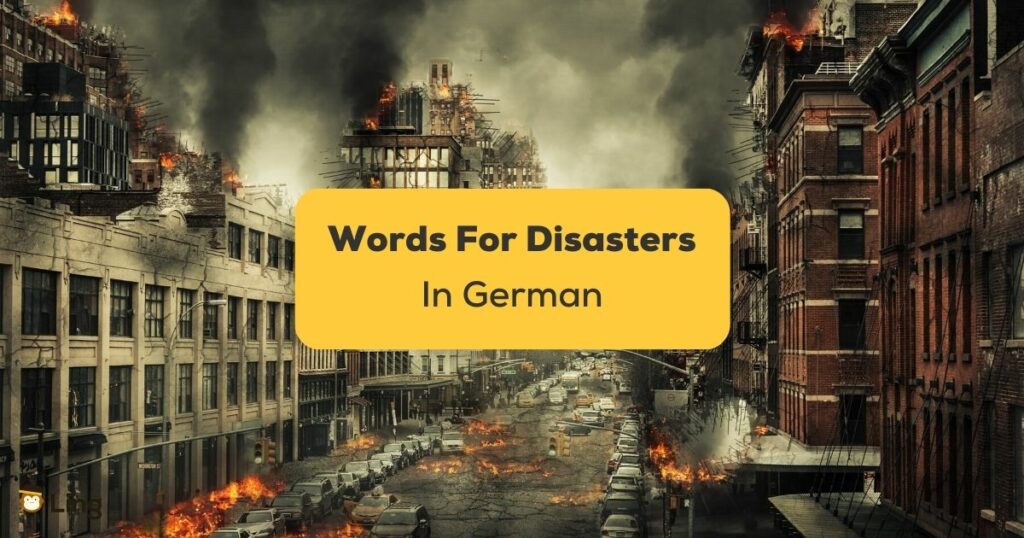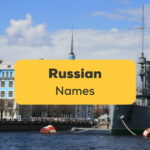No matter where you are in the world, we cannot deny that natural disasters or die Naturkatastrophe can strike at any time, and they can be incredibly devastating. In this post, we’ll go over the best words for natural disasters in German so you can prepare and be able to communicate effectively in the face of emergency situations. If you’re ready for that and more, then keep reading below!
Does the thought of traveling to exotic lands give you a rush of adrenaline? Well, we can all agree that packing our bags and getting ready for the trip of a lifetime is a feeling like no other! But as much as we plan and prepare for our trips, it’s crucial to be equipped for any unexpected events that may arise. I know that nobody wants to think about worst-case scenarios while traveling. But being a responsible globetrotter means taking precautionary measures to ensure you’re ready for whatever comes your way.
Sure, you might have your travel insurance and documentation sorted, but are you really prepared for a real emergency? I’m asking you this question because I’ve been in that situation before.
You see, back when I was staying in Germany, I remember being woken up by an alert from Catastrophe Warning System Cell Broadcast. For a moment, I thought it was a prank. To add to the confusion, I couldn’t understand German then and had no idea what was happening. Before I knew it, my kind neighbor was at my door, asking me to come with her due to an alert. As we hurriedly left, she explained that there was a possibility of a tsunami happening within the next hour, and we needed to evacuate.
My heart sank, but thankfully, the natural disaster didn’t happen. However, that incident was a wake-up call (literally and figuratively) for me. I knew I had to learn words for natural disasters to avoid being caught off-guard again. And that’s precisely what I did when I visited Germany again. To help you out in this quest, I have created here a comprehensive guide for all things related to German natural disasters so you can stay safe no matter where you are in the country. Let’s begin!

Adjectives Related To Weather In German
If there’s one thing I know about Germany, then that would be the fact that it has very unpredictable wetter (weather). One minute it’s drizzling, the second, it might already be too sunny for your comfort. Before we dive into all those advanced words for natural disasters in German, let’s first put the spotlight on the basic weather words and sentence structure you can use.
| English | German | Sound |
|---|---|---|
| Warm | Warm | |
| Hot | Heiß | |
| Cold | Kalt | |
| Sunny | Sonnig | |
| Cloudy | Bewölkt | |
| Rainy | Regnerisch | |
| Snowy | Schneebedeckt | |
| Windy | Windig | |
| Foggy | Nebelig | |
| Stormy | Stürmisch | |
| Hazy | Dunstig | |
| Humid | Feucht | |
| Dry | Trocken | |
| Misty | Nebelig |
Great! Now that you already know the basic adjectives to describe weather conditions, let’s now try to use them in a basic sentence following this pattern: Es ist + Weather adjective. Here are some examples to help you construct your own sentences.
- It is misty = Es ist neblig.
- It is humid = Es ist feucht.
- It is sunny = Es ist sonnig.
- It is rainy = Es ist Regnerisch.
- It is windy = Es ist windig.
See how easy it is to make your basic sentences? Of course, there are more complex ones that you can use, but what we covered above is already enough to help you express yourself better with the locals.

Extreme Natural Disasters In German
Germany is known for its ever-changing weather, which can sometimes take a turn for the extreme. From harsh winters to scorching summers, the weather in Germany can be unpredictable, and it’s crucial to be familiar with the language used to describe it. In this section, we’ll explore some extreme weather terms in German that you may encounter during your travels. These terms can be helpful in understanding weather forecasts and communicating with locals about the current weather conditions.
Natural Disasters In Germany
Germany is no stranger to natural disasters, and it’s essential to be aware of the potential risks before traveling to this country. Here are some of the most common natural disasters in Germany:
- Flooding: According to reports, Germany is prone to flooding, especially in the low-lying regions. Heavy rainfall and snowmelt can cause rivers to overflow, leading to property damage and even loss of life.
- Severe storms: Thunderstorms and hailstorms can be severe in Germany, especially during the summer months. High winds and lightning strikes can cause property damage and power outages.
- Landslides: Germany’s mountainous regions are susceptible to landslides, especially during heavy rainfall or snowmelt. Landslides can cause property damage, road closures, and even loss of life.
- Winter storms: Latest reports show that Germany can experience harsh winter weather, including heavy snowfall and ice storms. These conditions can lead to transportation disruptions, power outages, and property damage.
If you’re planning to visit Germany, remember that it’s important to stay informed about potential natural disasters. If possible, make sure to check weather reports regularly and follow any instructions or advice given by local authorities. Be prepared with the necessary supplies and an emergency plan in case of a natural disaster during your trip as well.
Expand Your German Vocabulary With Ling!
Want to start learning the German language and improve your pronunciation? Now is the best time to start using Ling for FREE! Ling is a language-learning resource developed to help beginners master German and 60+ other languages all within one device. Unlike other platforms, you wouldn’t be stuck here with mere translations or flashcards! Instead, you’ll get to learn expressions and cultural points that will be useful to you in real life. So whether you’re learning about words for emergencies or health and romance, we’ve got you covered!
And if you think the in-depth lessons are still not enough, wait till you see our best feature: an integrated chatbot! Yes! You read that right! Now you can simulate conversations and check if you understand the meaning of all the expressions and words you learned in the app.
Ready to give it a spin? Download Ling today from the Play Store or App Store today!


































































